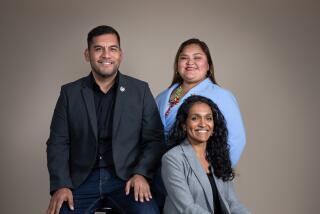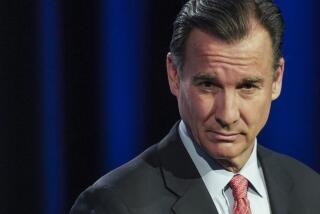Hong Kong Newcomer a Mover, Shaker
- Share via
HONG KONG — Emily Lau is outspoken, argumentative, liberal and proud of it.
Hong Kong’s only directly elected woman legislator is shaking up a cozy political system that British overseers and businessmen have run like a private club for 150 years.
“I subscribe to Western-style, multiparty politics,” the former journalist said in an interview. “I think the mobilization of the Hong Kong people through party politics is our only route to salvation, because politics is about power.”
Since taking office in October, Lau has pushed for 10 more directly elected legislative seats in 1995, two years before the British colony reverts to China. She sponsored a freedom of information bill and seeks an independent human rights commission to monitor events leading up to the transfer.
“I think she’s liberal, progressive and courageous,” said Albert Ho, a spokesman for Hong Kong’s leading political party, the liberal United Democrats. “As an independent, she has the liberty to be more aggressive.”
Although she has no party affiliation, Lau usually sides with other liberals, who won 17 of the 18 seats in the first direct elections last year.
Most of the 42 members who are appointed or chosen by special-interest groups are conservative professionals and allies of the government. Six of the 42 are women, all but one of them appointed.
Lau, 40, was born in Hong Kong and studied journalism at the University of Southern California in the Watergate years. She earned a reputation as an aggressive journalist in London and Hong Kong, most recently as Hong Kong correspondent for the Far Eastern Economic Review.
She jumped into the legislative race with no political experience or organizational support. Colleagues in the media gave her generally favorable coverage and she won the toughest race in the territory.
Lau kept her promise to make government officials more accessible to ordinary people. She has organized 11 open-microphone forums so some of her 750,000 constituents can question officials and businessmen.
“What I see myself as doing for them is . . . bringing them together so people will force the government to account for its actions,” she said.
Not everyone likes her style.
Sir Gordon Macwhinnie, a former chairman of the powerful Royal Hong Kong Jockey Club, said it was “monstrous” of Lau to suggest that the club gave contracts to friends for construction of the new University of Science and Technology. Legislators are investigating the allegations.
Others have questioned her commitment to the territory, because she holds a British passport from her first marriage to a British journalist. Most of Hong Kong’s 5.9 million citizens do not qualify for British passports.
“She looks as if she’s uncompromising, but she has security,” said David Chan, a conservative who ran unsuccessfully last year. “She doesn’t really have to count on what will happen after 1997.”
With typical bluntness, Lau says she may leave the territory because of its uncertain future. She doubts that China will honor its pledge to allow Hong Kong a “high degree of autonomy” for 50 years after the takeover.
Two days after the British accord with China was signed in 1984, Lau accused Margaret Thatcher, then the British prime minister, of selling the colony out. Thatcher retorted that everyone in Hong Kong was happy about the agreement, with the “solitary exception” of Lau.
Lau says her constituents approve: “The people think that this new political way of doing things is good. . . . They are more outspoken and they expect more of the government.”
More to Read
Sign up for Essential California
The most important California stories and recommendations in your inbox every morning.
You may occasionally receive promotional content from the Los Angeles Times.













